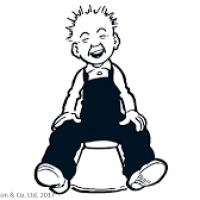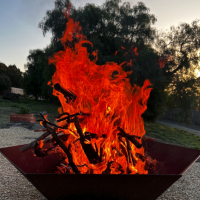Seemingly trivial things that intrigue you
Comments
-
Not sure why Spock keeps appearing.
0 -
So for your year 7, acid and alkali are terms most commonly used for aqueous (water based) systems. They correlate to more general terms Lewis acid or base, which I think they learn about in A-levels.
Anyhow, it is all to do with the effect these species have in solution. An acid leads to an excess of H+ ions (or more properly H3O+, because protons don't exist on their own) and an alkali leads to more OH- ions.
Some compounds when dissolved liberate H+, either from themselves.or because they preferentially attract OH-. These are acidic.
Other compounds do the opposite, liberate OH- from themselves, or preferentially attract H+. These are alkalis.
The result is a solution with more of one than the other. If there is more H+ floating around, the solution is acidic. If there's more OH-, it is alkaline.
That's it really.
Looks like something other than carotene is a pH indicator, and that it's reversible.
Cool.
0 -
No wonder I only got a C at O-level. Not even a smart Y10.
0 -
Hang on, isn't year 7 11 year olds? They havent been taught what atoms are yet? Wtf have they been taught? That there are four elements; earth, fire, wind and water?
0 -
Please.dont ask me about Lewis acids and bases. The background to that takes a couple of years. I think they used to float the concept at A level but it makes no sense until it's underpinned by some degree level stuff.
0 -
Well I was, but I'll hold back now, despite my C at O-level.
0 -
My daughter is year 6 (final year primary) and not sure if she knows about atoms. Their science curriculum doesn't seem to have much chemistry. Loads of biology, bit of states of matter (freezing, evaporating et), bit of planets, bit of electrical circuits.
It does seem a bit basic, especially compared to the English grammar that they do, which is pretty much beyond me
0 -
"Atoms" is about as difficult to comprehend as Lego. Whereas if you don't know what they are, quite a lot of the rest of that stuff is more preplexing than it needs to be.
0 -
I agree, I have a science ish background (chemistry & physics a level, material science degree) and find the science curriculum at primary level to be pretty lacklustre. The cabbage experiment was one that we did as a holiday project (no actual experiments were assigned, we could choose anything). They also haven't learned the basics of writing up an experiment, which seemed strange
I suspect I have probably explained atoms to her before but doubt she remembers much about it.
0 -
Actually it's not that bad, you just need to know what the chemical bond is, that there might be "spare" unbonded electrons looking for something to bond with, a capacity to be bonded to elsewhere, and about electronegativity.
I've just looked up electronegativity on Wikipedia and you can treat it as just something that is, and it lets you understand a bit about valence and acidity.
It is definitely A-level, possibly not first year degree.
Understanding why valence is what it is, and why electronegativity follows the trends that it does, and why it can vary for a particular element based on it's chemical state, that's degree level stuff. It is more or less following the development of our understanding of matter through the 19th and 20th centuries.
0 -
I distinctly remember getting a book on “space” for my 8th birthday which explained atoms in terms of nuclei and electrons and how that determined what elements you got.
Didn’t get as far as chemical bonds and free elections etc till year 9
0 -
Atoms are covered in KS3 (11-14) from memory, in the first year.
1985 Mercian King of Mercia - work in progress (Hah! Who am I kidding?)
Pinnacle Monzonite
Part of the anti-growth coalition0 -
Particles, chemical/physical change, that sort of thing... (Atoms come later)
Kids these days aren't taught how to write up things in science, blame/praise* Mr. Gove.
*(and there is a genuine debate there...)
We're in danger of confusing passion with incompetence
- @ddraver0 -
Things have no doubt change since I was in school (and even since my daughters were) but I don’t recall ‘real’ science being taught until secondary school. Atoms would have been one of the first things we learned at that point though along with compounds, valencies and all that stuff I no longer remember unfortunately despite it being one of my favourite subjects.
0 -
Was it the constraints of the material that resulted in the new Gabba R looking like terrible fetish wear or was it a conscious choice.
1 -
When I was in year 6, I had to explain to the teacher that the distance across the diagonal of a square was further than along the sides. Really can't imagine atoms were a subject matter.
0 -
Isn't Pythagorean theory quite complex? Like proving 1 x 1 is 1? That's degree level maths.
Or does "explain why" really mean "explain that"?
Atoms are year 7, I just looked it up. Or part way through middle school, in old money. This means a lot of kids, you would hope, already came across the concept from parents, older siblings, books*, asking questions in school.
*This is an old concept, now replaced by the internet
0 -
1 and 1 is 1 is Medicine Head, innit.
0 -
Yeah but proving it is hard. So is defining zero. I was told.
0 -
He said explain that. Also, not familiar with the term middle school but here year 7 is first year of comprehensive (age 11-12).
0 -
Anyway, I’m intrigued by people who feel the appropriate response to a solar eclipse is to clap and cheer it as though one of the objects involved has planned it all for them.
0 -
The same people who clap in cinemas?
0 -
I made the mistake of watching Independence Day in a US cinema when it first came out. I swear some of them thought it was a news reel and the Yanks had genuinely saved Earth.
0 -
Middle school was before high, or secondary , school and after first school. Not sure where year 7 sits in that case. Secondary?
0 -
Yeah, first year secondary (in these parts at least - I think the English system is the same).
For me it was always infants, junior and secondary although the first two were the same primary school. The ‘new’ system decided to start with reception to confuse things. I haven’t got a clue when people talk about key stages though.
0 -
Infant School: yes R, 1 & 2. KS1
Junior School: yrs 3-6 inclusive KS2
Secondary School: yrs 7-11 inclusive KS3&4
6th form: yrs 12 & 13.
1985 Mercian King of Mercia - work in progress (Hah! Who am I kidding?)
Pinnacle Monzonite
Part of the anti-growth coalition0 -
“Didn’t get as far as chemical bonds and free elections etc till year 9…”
I suspect this means you did Political Science and not actual science. 😁
Open One+ BMC TE29 Seven 622SL On One Scandal Cervelo RS0 -
I saw Die Hard in Montreal. There was a big cheer when Liberte de Quebec got mentioned. What made it stranger is that no such group exists. 🤔
The above may be fact, or fiction, I may be serious, I may be jesting.
I am not sure. You have no chance.Veronese68 wrote:PB is the most sensible person on here.0 -
What is it about people on hired electric scooters that instantly gets me riled up and annoyed.
Absolutely out of proportion. Logically it's absolutely fine, what's wrong with me.
0











